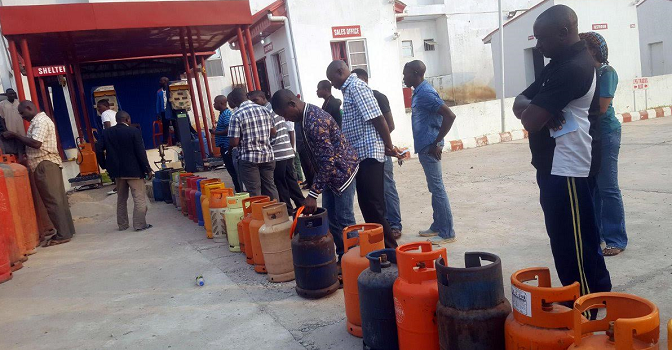As Nigerians grapple with the rising cost of living, the price of Liquefied Petroleum Gas (LPG), commonly known as cooking gas, has surged to N1,500 per kilogram.
This increase has sparked concerns among consumers who rely on LPG for their daily cooking needs.
Suresh Kumar, Managing Director and Chief Executive Officer of NIPCO Plc, has expressed optimism that the upcoming Dangote refinery and other domestic refineries will help lower cooking gas prices in the future. He pointed out that over 60 percent of cooking gas consumed in Nigeria is currently imported, exacerbating the price fluctuations.

Recent checks revealed that cooking gas prices reached N1,500/kg at various retail outlets in Ogun and Lagos States as of Sunday. In Abuja, the average cost to refill a 12.5kg cylinder of cooking gas has risen by 41.6 percent, now standing at N17,000. This marks a significant increase from N12,000 in July and N11,735 in January 2024.
Despite promises from the Minister of State for Petroleum Resources (Gas), Ekperikpe Ekpo, to address the escalating costs, a market survey conducted on Sunday indicated that prices continue to rise rather than fall. For instance, in Lokogoma, a 12.5kg cylinder is priced at N17,000, reflecting a 41.6 percent increase from three months ago, equating to N1,400 per kilogram.
In Kubwa, the price ranges from N16,200 to N16,500, up from N12,000 previously. However, in outskirt areas such as Bwari, Kurudu, and Jikwoyi, the price is slightly lower at around N1,300.
The ongoing price hikes have led to concerns from officials, such as the Commissioner for Environment in Ogun State, Ola Oresanya, who warned that many households might resort to using charcoal for cooking if the price of LPG continues to climb.
Speaking at the National Conference of the Nigerian Association of Liquefied Petroleum Gas Marketers 2024 in Lagos, Kumar noted that local production of LPG remains insufficient. He urged the Federal Government to encourage companies like Chevron to convert more of their propane output into butane for domestic use.
Kumar stated, “Currently, less than 40 percent of the 1.5 million metric tonnes consumed domestically is produced locally. The government must encourage companies like Chevron to convert more of their propane output into butane, which is more suitable for domestic use.”
He expressed hope that as domestic production increases, particularly with local refineries sourcing crude oil locally, prices for cooking gas would eventually decline. Kumar emphasized the importance of boosting local production to reduce dependence on imports and mitigate price fluctuations.
As demand for LPG in Nigeria remains relatively stagnant due to high prices, Kumar remains optimistic that the market will stabilize soon with increased participation from players in the gas processing sector. He urged the Federal Government to support local refineries, including the Dangote Refinery, to enhance domestic gas production and ultimately drive down retail prices, making LPG more accessible to Nigerians.



